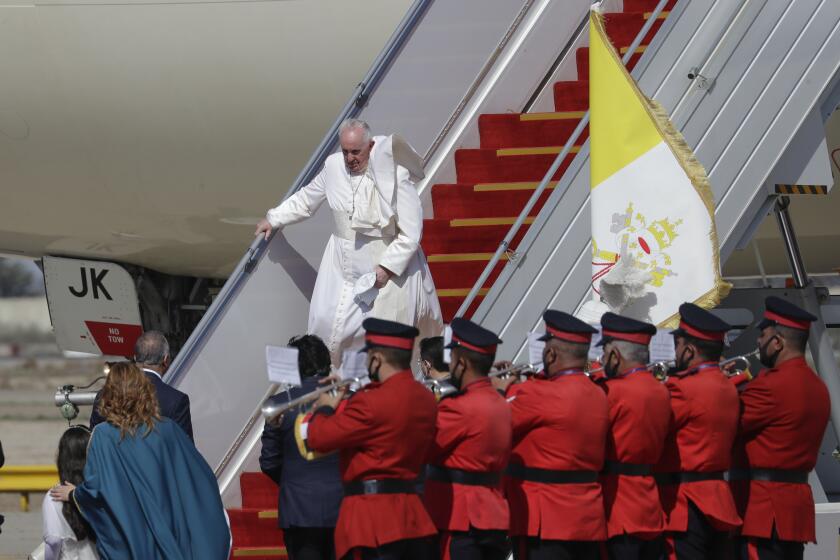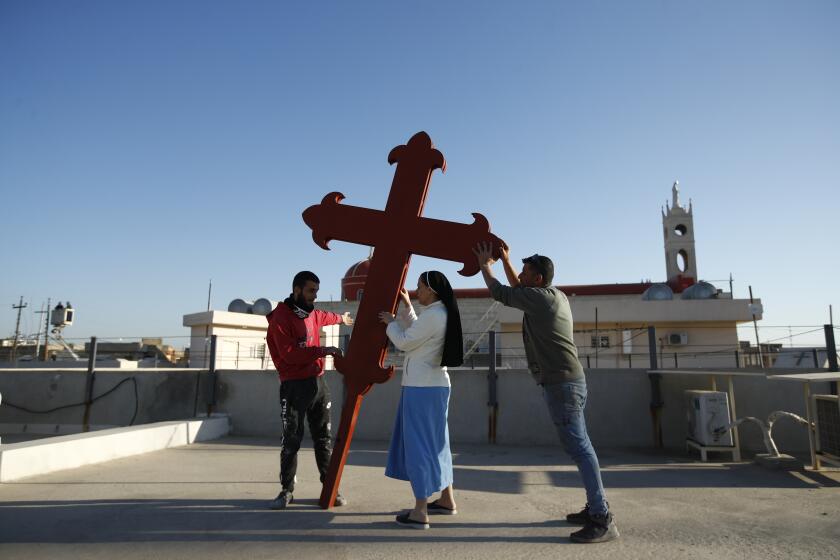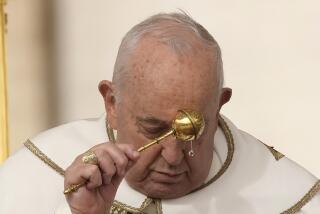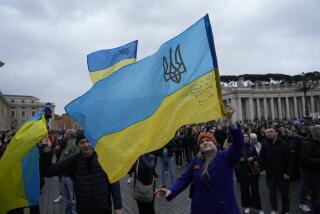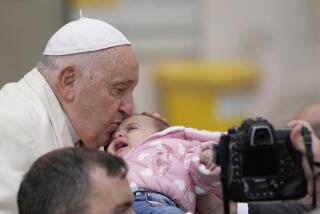Pope Francis and Iraq’s top Shiite cleric hold historic meeting
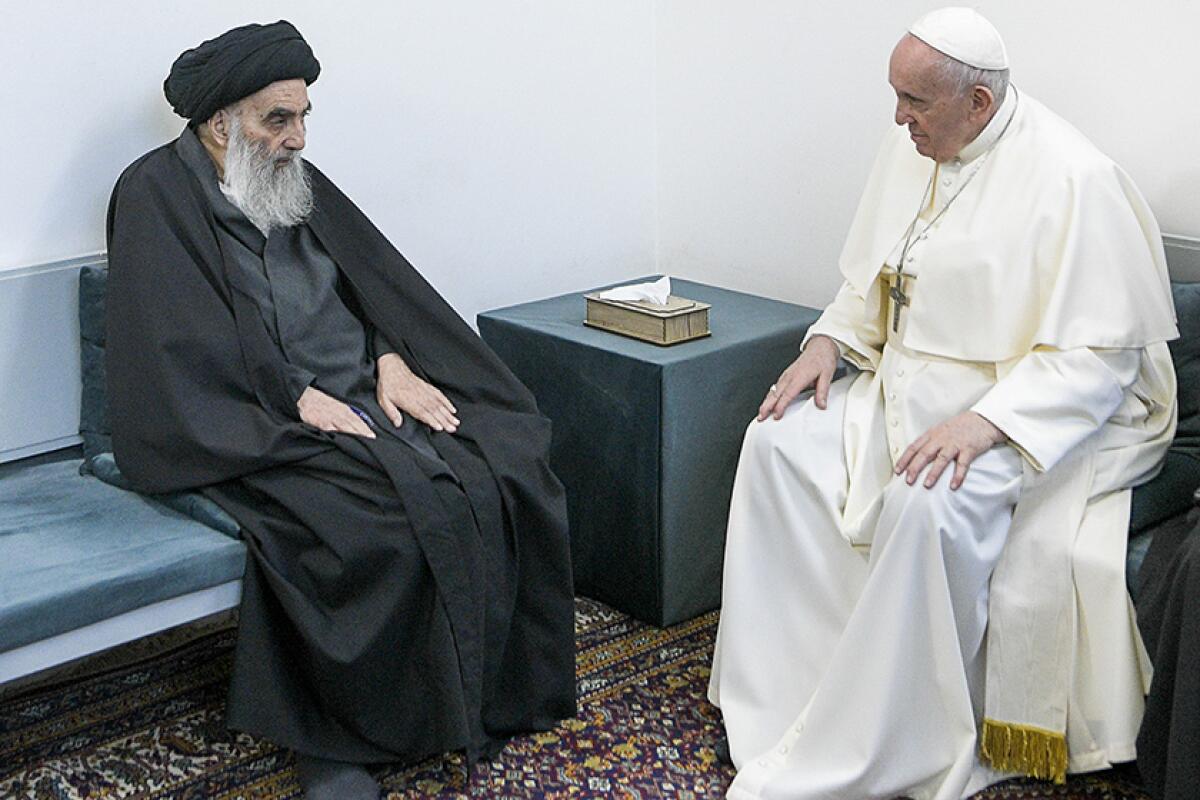
- Share via
PLAINS OF UR, Iraq — Pope Francis and Iraq’s top Shiite cleric delivered a powerful message of peaceful coexistence Saturday, urging Muslims in the war-weary nation to embrace Iraq’s long-beleaguered Christian minority during a historic meeting in the holy city of Najaf.
Grand Ayatollah Ali Sistani said that religious authorities have a role in protecting Iraq’s Christians, and that Christians should live in peace and enjoy the same rights as other Iraqis. The Vatican said Francis thanked Sistani for having “raised his voice in defense of the weakest and most persecuted” during some of the most violent times in Iraq’s recent history.
Sistani, 90, is one of the most senior clerics in Shiite Islam, and his rare but powerful political interventions have helped shape present-day Iraq. He is a deeply revered figure in Shiite-majority Iraq, and his opinions on religious and other matters are sought by Shiites worldwide.
The historic meeting in Sistani’s humble home was months in the making, with every detail painstakingly discussed and negotiated between the ayatollah’s office and the Vatican.
Early Saturday, the 84-year-old pontiff, traveling in a bulletproof Mercedes-Benz, pulled up along Najaf’s narrow and column-lined Rasool Street, which culminates at the golden-domed Imam Ali shrine, one of the most revered sites in Shiite Islam. He then walked the few yards to Sistani’s home, which the cleric has rented for decades.
Francis becomes the first pontiff to visit Iraq, where he hopes to shore up the fast-dwindling Christian community and promote religious harmony.
A group of Iraqis wearing traditional clothes welcomed him outside. As a masked Francis entered the doorway, a few white doves were released in a sign of peace. He emerged just less than an hour later, still limping from an apparent flare-up of sciatica nerve pain that makes walking difficult.
The “very positive” meeting lasted a total of 40 minutes, said a religious official in Najaf, who spoke on condition of anonymity because he was not authorized to brief media.
The official said Sistani, who normally remains seated for visitors, stood to greet Francis at the door of his room — a rare honor. Sistani and Francis sat close to each other, without masks.
The official said there was some concern about the fact that the pope had met with so many people the day before. Francis has received a COVID-19 vaccine, but Sistani has not.
The pope removed his shoes before entering Sistani’s room. Sistani spoke for most of the meeting. Francis was served tea and a plastic bottle of water but drank only the latter. Francis paused before leaving Sistani’s room to have a last look, the official said.
The pope arrived later in the ancient city of Ur for an interfaith meeting aimed at urging Iraq’s Muslims, Christians and other believers to put aside historical animosities and work together for peace and unity. Ur is the traditional birthplace of Abraham, the biblical patriarch revered by Christians, Muslims and Jews.
“From this place, where faith was born, from the land of our father Abraham, let us affirm that God is merciful and that the greatest blasphemy is to profane his name by hating our brothers and sisters,” Francis said. “Hostility, extremism and violence are not born of a religious heart: They are betrayals of religion.”
Terrorized by Islamic State, Iraq’s dwindling Christians hope a historic visit by Pope Francis starting next week will boost their chances to survive.
Religious leaders stood to greet him. Although Francis wore a mask, few of the leaders on the tented stage did. The meeting was held in the shadow of Ur’s magnificent ziggurat, the 6,000-year-old archaeological complex near the modern city of Nasiriya.
The Vatican said the historic visit to Sistani was a chance for Francis to emphasize the need for collaboration and friendship between different religious communities.
In a statement issued by his office after the meeting, Sistani affirmed that Christians should “live like all Iraqis, in security and peace and with full constitutional rights.” He pointed out the “role that the religious authority plays in protecting them, and others who have also suffered injustice and harm in the events of past years.”
Sistani wished Francis and the followers of the Roman Catholic Church happiness, and thanked him for taking the trouble to visit him in Najaf, the statement said.
For Iraq’s dwindling Christian minority, a show of solidarity from Sistani could help secure their place in Iraq after years of displacement — and, they hope, ease intimidation from Shiite militiamen against their community.
Iraqis cheered the meeting of two respected faith leaders.
”We welcome the pope’s visit to Iraq and especially to the holy city of Najaf and his meeting with Grand Ayatollah Ali al-Sistani,” said Najaf resident Haidar Ilyawi. “It is a historic visit and hope it will be good for Iraq and the Iraqi people.”
Francis arrived in Iraq on Friday and met with senior government officials on the first-ever papal visit to the country. It is also his first international trip since the start of the COVID-19 pandemic, and his meeting Saturday marked the first time a pope had met a grand ayatollah.
On the few occasions in which he has made his opinion known, the notoriously reclusive Sistani has shifted the course of Iraq’s modern history.
In the years after the 2003 U.S.-led invasion, he repeatedly preached calm and restraint as the Shiite majority came under attack by Al Qaeda and other Sunni extremists. The country was nevertheless plunged into years of sectarian violence.
His 2014 fatwa, or religious edict, calling on able-bodied men to join the security forces in fighting the Islamic State group swelled the ranks of Shiite militias, many closely tied to Iran. In 2019, as anti-government demonstrations gripped the country, his sermon lead to the resignation of then-Prime Minister Adel Abdul Mahdi.
Iraqis have welcomed the visit and the international attention it has given the country as it struggles to recover from decades of war and unrest. Iraq declared victory over the Islamic State group in 2017 but still sees sporadic attacks.
It has also seen recent rocket attacks by Iran-backed militias against U.S. military and diplomatic facilities, followed by U.S. airstrikes on militia targets in Iraq and neighboring Syria. The violence is linked to the standoff between the U.S. and Iran following the Trump administration’s withdrawal from the 2015 nuclear accord and its imposition of crippling sanctions on Iran. President Biden has said he wants to revive the deal.
Francis’ visit to Najaf and nearby Ur traverses provinces that have seen recent instability. In Nasiriya, near the Plains of Ur, violent protests left at least five dead last month. Most were killed when Iraqi security forces used live ammunition to disperse crowds.
Protest violence was also seen in Najaf last year but abated as the mass anti-government movement that engulfed Iraq gradually subsided.
Associated Press writers Khalil reported from Najaf, Winfield from the Plains of Ur and Abdul-Zahra from Baghdad. AP writer Samya Kullab in Baghdad contributed to this report.
More to Read
Sign up for Essential California
The most important California stories and recommendations in your inbox every morning.
You may occasionally receive promotional content from the Los Angeles Times.
